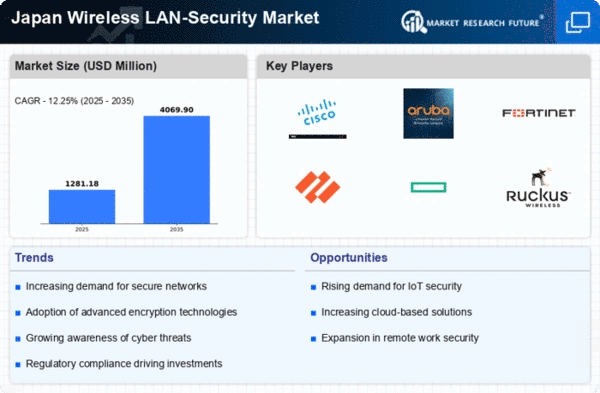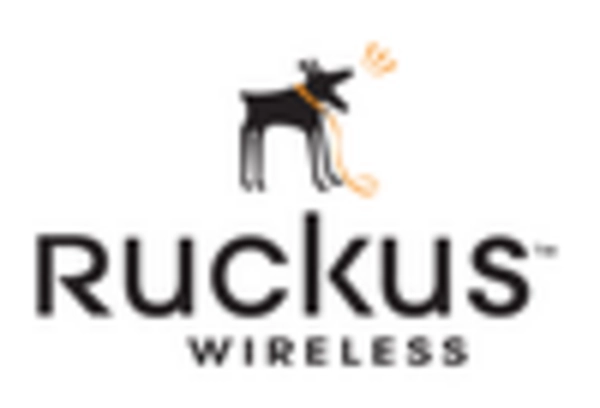Expansion of Remote Work
The shift towards remote work in Japan has catalyzed a transformation in the wireless lan-security market. With more employees accessing corporate networks from various locations, the demand for secure wireless connections has surged. According to recent data, approximately 40% of the Japanese workforce is now engaged in remote work, necessitating enhanced security protocols to protect sensitive information. This trend has led organizations to adopt advanced wireless security solutions, including VPNs and encryption technologies, to mitigate risks associated with remote access. As remote work continues to be a prevalent model, the wireless lan-security market is poised for substantial growth.
Rising Cybersecurity Threats
the wireless LAN-security market is experiencing heightened demand due to the increasing frequency and sophistication of cyber threats. As organizations face a growing number of attacks, including ransomware and phishing, the need for robust security measures becomes paramount. In 2025, it is estimated that cybercrime could cost the Japanese economy over $1 trillion, prompting businesses to invest heavily in wireless security solutions. This trend indicates a shift towards comprehensive security frameworks that encompass not only hardware but also software and training. Consequently, the wireless lan-security market is likely to see significant growth as companies prioritize safeguarding their networks against potential breaches.
Growing Awareness of Data Privacy
There is a burgeoning awareness of data privacy among consumers and businesses in Japan, which is significantly impacting the wireless lan-security market. As individuals become more conscious of their personal information and its potential misuse, organizations are compelled to adopt stringent security measures. Surveys indicate that over 70% of Japanese consumers prioritize data privacy when choosing service providers. This shift in consumer expectations is driving businesses to invest in advanced wireless security solutions to protect customer data and maintain trust. Consequently, the wireless lan-security market is likely to experience robust growth as organizations respond to this increasing demand for data protection.
Increased Regulatory Compliance Requirements
The wireless lan-security market in Japan is significantly influenced by the tightening of regulatory compliance requirements. Organizations are now mandated to adhere to stringent data protection laws, such as the Act on the Protection of Personal Information (APPI). Non-compliance can result in hefty fines, which may reach up to ¥100 million. This regulatory landscape compels businesses to invest in comprehensive wireless security solutions to ensure compliance and protect sensitive data. As companies strive to meet these requirements, the wireless lan-security market is expected to grow, driven by the need for solutions that facilitate compliance and enhance overall security posture.
Technological Advancements in Security Solutions
Innovations in technology are driving the evolution of the wireless LAN-security market. The introduction of next-generation firewalls, intrusion detection systems, and advanced encryption methods is reshaping how organizations approach network security. In 2025, the market for wireless security solutions is projected to reach $2 billion, reflecting a growing recognition of the importance of cutting-edge technology in safeguarding networks. These advancements not only enhance security but also improve user experience, making it easier for organizations to implement effective security measures. As technology continues to evolve, the wireless lan-security market is likely to expand further.
















